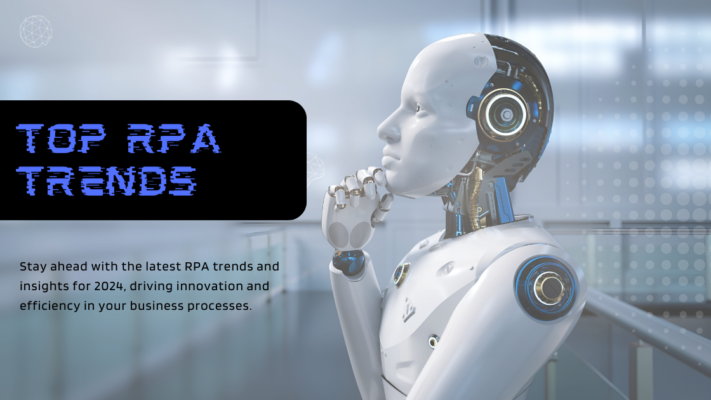
The digital transformation wave has swept across industries, compelling organizations to embrace cutting-edge technologies that drive operational efficiency and unlock new avenues for growth. In this ever-evolving landscape, Robotic Process Automation (RPA) has emerged as a game-changer, revolutionizing how businesses approach repetitive and rule-based tasks. As we stride into 2024, the RPA landscape is poised for remarkable advancements, fueled by the convergence of artificial intelligence (AI), machine learning (ML), and cognitive automation.
This comprehensive guide explores the top RPA trends that are shaping the future of automation, providing valuable insights for businesses seeking to harness the power of this transformative technology and gain a competitive edge.
Intelligent Automation: The Convergence of RPA, AI, and ML
While traditional RPA excels at automating repetitive, rule-based processes, the integration of Artificial Intelligence and ML is ushering in a new era of intelligent automation. This powerful fusion enables RPA solutions to tackle more complex processes, make data-driven decisions, and adapt to changing circumstances, transcending the boundaries of conventional automation.
Intelligent automation combines the strengths of RPA, AI, and ML to create intelligent digital workforces capable of mimicking human actions, perceiving and interpreting data, and making informed decisions. By leveraging these advanced technologies, organizations can automate intricate processes, streamline operations, and unlock unprecedented levels of efficiency.
Hyper-Automation: Realizing End-to-End Process Optimization
Hyper-automation is a prominent RPA trend that is gaining significant traction, promising to revolutionize how organizations approach process automation. It involves the orchestrated use of advanced technologies, such as RPA, AI, ML, and process mining, to automate end-to-end business processes across an enterprise.
By combining these complementary technologies, hyper-automation enables organizations to identify, analyze, and automate complex processes, minimizing human intervention and maximizing operational efficiency. This holistic approach not only enhances productivity and reduces costs but also fosters improved accuracy, compliance, and customer experiences.
Cloud-Based RPA: Scalability and Flexibility on Demand
As organizations embrace cloud computing and digital transformation initiatives, the demand for cloud-based RPA solutions is rapidly increasing. Cloud-based RPA offers unparalleled scalability, flexibility, and cost-effectiveness, empowering businesses to rapidly deploy and scale RPA solutions without the need for extensive on-premises infrastructure investments.
Moreover, cloud-based RPA enables seamless access to the latest RPA capabilities and updates, ensuring organizations remain at the forefront of technological advancements. With robust security measures and compliance standards inherent to cloud platforms, businesses can confidently leverage cloud-based RPA while mitigating potential risks and ensuring data protection.
Low-Code/No-Code RPA: Democratizing Automation for All
The rise of low-code and no-code RPA platforms is democratizing automation, making it accessible to a broader range of users, including business analysts, subject matter experts, and citizen developers. These user-friendly platforms empower non-technical users to design, develop, and deploy RPA solutions without extensive programming knowledge, significantly reducing the time and resources required for automation initiatives.
Leveraging intuitive drag-and-drop interfaces, pre-built components, and visual programming environments, low-code/no-code RPA platforms foster rapid prototyping and deployment of automation solutions. This democratization of RPA not only accelerates automation adoption but also cultivates a culture of innovation and agility within organizations.
Process Mining and RPA: Unlocking Process Optimization Opportunities
Process mining, a discipline that analyzes and visualizes business processes based on event log data, is increasingly being integrated with RPA to unlock unprecedented process optimization opportunities. By combining process mining with RPA, organizations can gain comprehensive insights into their processes, and identify bottlenecks, inefficiencies, and areas for improvement.
This powerful combination enables data-driven decision-making about which processes to automate, streamlining existing workflows, and optimizing operations for maximum efficiency. Furthermore, process mining can help identify automation opportunities that may have been overlooked, enabling organizations to maximize the benefits of their RPA investments.
Responsible Automation: Addressing Ethical and Governance Concerns
As RPA adoption continues to grow, addressing ethical and governance concerns surrounding automation becomes an increasingly critical priority. Responsible automation emphasizes the importance of ensuring that RPA solutions are deployed in a manner that aligns with ethical principles, respects privacy and data protection regulations, and upholds organizational values.
To foster trust and transparency, organizations are developing robust governance frameworks, establishing clear policies and guidelines, and implementing robust security measures to mitigate potential risks associated with RPA deployments. This proactive approach to responsible automation not only ensures compliance but also builds confidence among stakeholders, paving the way for successful and sustainable RPA initiatives.
The Hybrid Human-Bot Workforce: Enhancing Collaboration and Productivity
The future of work lies in the seamless integration of human and digital workforces, enabling organizations to leverage the unique strengths of both. RPA plays a pivotal role in this hybrid workforce model, enabling humans and bots to collaborate and complement each other’s capabilities.
By automating repetitive and mundane tasks, RPA frees up human workers to focus on higher-value activities that require critical thinking, creativity, and emotional intelligence. This symbiotic relationship between humans and digital workers not only enhances productivity and efficiency but also fosters a more engaging and fulfilling work environment for employees.
Cognitive Automation: Synergizing RPA and Artificial Intelligence
The integration of RPA and AI is paving the way for cognitive automation, where automation solutions can perceive, learn, and adapt to dynamic environments. By combining RPA’s task automation capabilities with AI’s cognitive abilities, such as natural language processing, computer vision, and machine learning, organizations can automate more complex and unstructured processes.
Cognitive automation enables RPA solutions to handle tasks that were previously considered too complex or unstructured for traditional automation approaches. This synergy between RPA and AI unlocks new frontiers of automation, empowering organizations to streamline intricate processes, enhance decision-making, and drive innovation across various industries.
Summing Up: Embracing RPA Trends with Upcore Technologies
As the RPA landscape continues to evolve, organizations must stay ahead of the curve and leverage these cutting-edge trends to drive operational excellence and gain a competitive edge. By embracing RPA and its associated technologies, businesses can unlock unprecedented levels of efficiency, productivity, and agility.
At Upcore Technologies, we understand the transformative potential of RPA and its role in shaping the future of work. As a leading provider of RPA services and solutions, we offer a comprehensive suite of offerings to help organizations navigate the complexities of automation and achieve their desired outcomes.
Our team of certified RPA experts brings a wealth of industry experience and a deep understanding of the latest RPA trends and best practices. We work closely with our clients to assess their unique requirements, develop tailored RPA strategies, and implement end-to-end automation solutions that drive measurable results.
Upcore Technologies’ RPA services encompass the following:
- RPA strategy and roadmap development
- RPA solution design and implementation
- RPA platform selection and deployment
- Integration with AI, ML, and cognitive automation
- Process mining and optimization
- RPA governance and compliance
- Training and change management
- Ongoing support and maintenance
By partnering with Upcore Technologies, organizations can leverage our expertise, proven methodologies, and a commitment to delivering measurable results. Whether you are embarking on your initial RPA journey or seeking to optimize existing automation initiatives, we offer the support and guidance needed to unlock the full potential of RPA and drive operational excellence.
In the rapidly evolving digital landscape, embracing the top RPA trends is no longer an option but a necessity for organizations seeking to stay ahead of the competition. By fostering a culture of innovation, agility, and continuous improvement, businesses can leverage the power of automation to streamline operations, enhance customer experiences, and drive sustainable growth.


